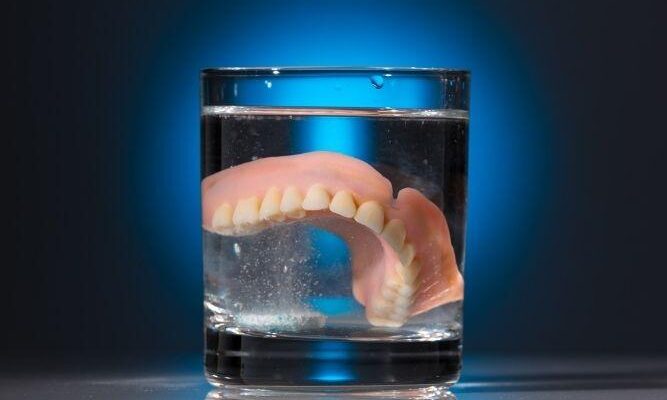Let’s be frank: Dentures are expensive. The expense is well worth it for the quality of life that they deliver, but there are very, very few people who could afford to have their dentures replaced every year.
Fortunately, dentures are also built to last – a lifespan of 7-10 years, or even longer, is common. Of course, the life of your dentures will depend on how well you care for them – and that’s why we’ve written this article.
We’re going to cover every element of denture care, from how to put them on properly to how to clean them. That’s a lot of information to sink your teeth into, so let’s get started right away!
Learn how to put your dentures on properly
The key to putting your dentures on is care. The process shouldn’t require very much force at all. With full suction dentures, it’s okay to bite down once the dentures are in place. With partial dentures and dentures affixed to implants (snap-ins), however, you don’t want to use bite force – the denture should click (or snap) into place with only gentle pressure from your fingertips.
When removing your dentures, don’t use excessive force, and avoid using objects to remove the dentures, as they could damage both your dentures and your gums.
You’ll want to clean your mouth before inserting your dentures – we’ll cover this in more depth later in this article. At the very least, brush your gums and swish water in your mouth before inserting your dentures.
Always be careful when handling your dentures – try not to bend the metal clasps!
Don’t be afraid to ask for repairs
At some point, even if you treat your dentures with great care, they may be damaged. You may find your artificial teeth chip, crack, break, or even fall out. This could be as a result of an impact, wear and tear, mishandling, or any number of other causes. Don’t try to attempt repairs on the dentures yourself – you’ll risk making the problem worse. Get professional repairs done as soon as possible – delaying can lead to discomfort and an unbalanced bite, which can lead to more damage.
The base of your dentures can also wear out and crack – and that’s an even more pressing concern than if the teeth are damaged! Go for repairs right away.
Another vital component in denture repair is treating bent or broken clasps. If your dentures suddenly aren’t clicking into place, or if a clasp breaks, get it repaired as soon as possible. Applying too much pressure to try to get it to snap can lead to more damage to the denture and could damage your gums.
Clean your dentures properly
Cleaning your dentures properly is essential. Not cleaning your dentures won’t impact their lifespan directly – but it will affect your oral health, which in turn can affect the useful lifespan of your dentures. After all, if you lose the teeth or implants your dentures were affixed to, you won’t be able to use dentures with clasps. And if your gums are inflamed or damaged, your suction dentures may be too uncomfortable to wear!
As such, it’s essential you clean your dentures several times a day – and that you do it carefully to avoid damaging the denture. Rinse your denture after every meal, following the tips above for removal and handling. Brush your dentures at least once a day (preferably twice a day), using a soft-bristled toothbrush and a non-abrasive denture cleaner. Remove your dentures before doing this – you don’t want denture cleaner in your mouth.
Soak your dentures with a denture-soaking solution nightly, and rinse them thoroughly before putting them back in your mouth. Never use hot water to soak your dentures.
Take care of your implants
Depending on the type of denture you have, you may have implants. Implants are a lot like regular teeth, but they’re much more fragile. That means you should take care when you clean them – brush with a soft-bristled toothbrush very gently, and floss gently. Depending on the type of dentures you have, your denturist may give you special tools to clean your implants and dentures – follow their advice!
Don’t forget your teeth and gums!
Clean your gums thoroughly after removing dentures – it’s best practice to massage them with a soft-bristled toothbrush every time you remove them and before you put them back on in the morning. You’ll want to try to get every bit of foodstuff – once you’re done brushing your gums, rinse your mouth thoroughly.
For those with partial dentures, brush your teeth thoroughly, and be sure to brush your gums – pay special attention to the gums that are covered by the denture, and the teeth that the denture is affixed to.
Caring for your oral health can help you avoid gum disease and other oral health problems that can affect the comfort of your dentures. It’s important!
Talk to your denturist
Your denturist will give you all kinds of tips and tricks to help you care for your dentures. No two dentures are exactly alike, after all, so professional advice is of the utmost importance. You should see your denturist regularly – they’ll probably advise you to visit once every six months, or at least once a year. Think of it as a dental appointment!
Looking for dentures in Winnipeg? Call Borbely Swiss today. Our experienced team specializes in the Swiss Denture Concept, which uses high-quality materials to create comfortable, natural-looking, and feeling dentures.
Take care of your dentures, take care of your mouth, and your dentures will last you a decade or longer. That’s how you can get the most value out of your investment – one we believe is incredibly worthwhile!

